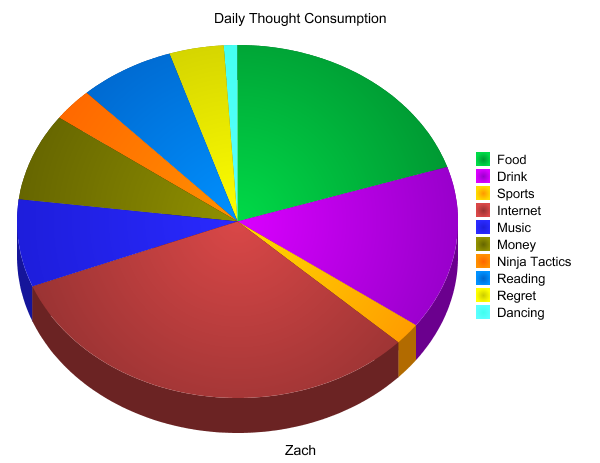If you could develop a Pie Chart of what your brain is consumed by on the average day, what would it look like? I took the liberty of providing mine…:
A couple items to note: 1) Yes, that says “ninja tactics” and 2) no slice of the pie is dedicated to “passive observation”.
Lately, one of my most reoccurring thoughts has been to spend less time thinking, as ironic as that may sound. That doesn’t mean I aspire to be more like Paris Hilton. Instead, I realize I spend far too much time wrapped up in my own thoughts. On average, all but 2-3 minutes a day are spared from processing some bit of information: “what I should make for dinner,”, “what time to set my alarm for,”, “who I need to call back,”, “words that rhyme with raspberry,” etc. I can mentally prepare an entire conversation with someone, with their physical presence being entirely optional (I know, I’m crazy). My brain is hyperactive – every second I can direct my attention elsewhere is like providing water to someone crossing the Sahara.
Although I’m probably at one end of the mind chatter spectrum, I know many of us suffer from this to some degree as well (I assume the Dalai Lama is a fan of the Good Badger, that’s why I use “many of us”). So then, how can we quiet these self inflicted voices? Different people use different methods. Some wander off into nature, some practice yoga, some meditate, most overindulge in Enya. Either way, creating space in your life for some objective observation is a skill that is both undervalued and under-utilized.
Personally, there have been points in my life where I’ve been much more in the present than I’ve been lately. This was a skill I took so seriously, in fact, that I partook in a 72-hour organic juice fast. The purpose of such an act of insanity: redirect energy away from the perpetual act of digestion, to other under-served segments of the body. Come the final day of the fast (mini-starvation), colors shined brighter, sounds rang more clear, smells were more fragrant, and my clarity of thought was more pure than ever. These sensation enhancements were certainly a pleasurable experience – but this was not my greatest takeaway. In these moments of sheer consciousness I dedicated a couple hours or more to silent meditation. Upon my return back to earth, I felt a sense of bliss that cannot accurately be put into words.
Of course, my experiences were not accidentally stumbled upon (I’m no Christopher Columbus). The effects of meditation have been well documented by scientific research. According to this study, up to 90% (!) of all doctors visits are induced by stress (look no further as to why America is one of the more unhealthy developed nations in the world – I’m looking at you 60 hour work weeks!) As the study points out, the act of meditation can serve as a cure to the anxiety that results from this stress. In other words – meditation could store the potential to reduce up to 90% of doctor’s visits!
Beyond a greater sense of relaxation in the face of a high strung society, the benefits of meditation have been documented to include: a decrease in headaches and muscle tension, curing effects from depression, a decrease in arthritis and allergies, a reduction in the effects of PMS (a major benefit for both guys and girls alike), and an increased immunity (even documented cases of curing cancer), amongst many others.
There is plenty of good information available on this subject, despite the fact that it might not be considered mainstream – which shouldn’t come as a surprise to anyone. We live in a country where lobbyists from drug and insurance companies feed the pockets of those who are making the laws and regulations. We won’t likely see the FDA endorsing meditation as a route to fight illness, because there’s not enough revenue stream in healthy Americans, especially if the route to health can largely be obtained free of charge.
Don’t just take my (conspiracy touting) word for it, try it out for yourself. A couple of resources I’ve found especially helpful would be Eckhart Tolle’s A New Earth and Deepak Chopra’s Life After Death (the former provides much more meditative technique than the latter, but both are equally eye opening in my mind). Also, I feel like I’ve only scratched the surface when it comes to the topic, there are likely dozens of books containing just as good if not better information (that’s what the comments at the bottom of the page are there for).
Challenge yourself and incorporate some of these meditative techniques into your life. I’m confident you’ll find the present to be a greater present than you’d ever imagine.
